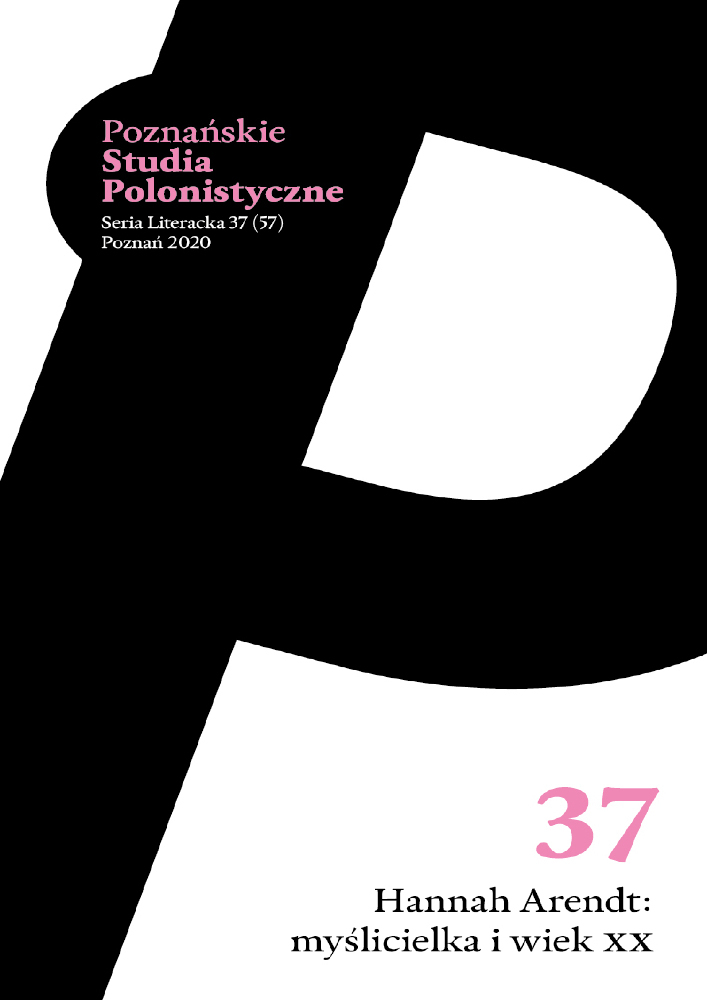Abstrakt
The article attempts to analyse Hannah Arendt’s short essay “We Refugees” published in 1943 in a Jewish magazine The Menorah Journal in the context of the current humanitarian crisis (a crisis of reception policies) and peace studies. It also reconstructs refugee themes in the life trajectory of the author of Eichmann in Jerusalem. The author is confident that the essay “We Refugees” from seventy-seven years ago allows one to speak up repeating the questions concerning one of the key problems of contemporary world – the condition of the outcasts.
Bibliografia
Adler Laure (2008), Śladami Hannah Arendt, przeł. Janina Aleksandrowicz, Twój Styl, Warszawa.
Agamben Giorgio (2000), Means without Ends. Notes on Politics, University of Minnesota Press, Minneapolis.
Arendt Hannah, Bauer Wolfgang, Burnier Michel-Antoine i in. (1973), Appeal for Peace in the Middle East, [dostęp: 27 maja 2020], https://tinyurl.com/yb25g6bt.
Arendt Hannah (1973), Origins of Totalitarianism, A Harvest Book, Orlando–Austin–New York.
Arendt Hannah (1996), We Refugees, w: Altogether Elsewhere. Writers on Exile, red. Marc Robinson, Faber and Faber, Boston–London, s. 110-119.
Arendt Hannah (1997), Lectures on Kant’s Political Philosophy, red. and with an interpretive essay by Aron Arthur, Melinat Edward,
Aron Elaine N. i in., The Experiment Generation of Interpersonal Closeness, [dostęp: 28 sierpnia 2020], https://tinyurl.com/yyvjfopu.
Aron Arthur, Melinat Edward, Aron Elaine N. i in. (1997), The Experiment Generation of Interpersonal Closeness, [dostęp: 28 sierpnia 2020], https://tinyurl.com/yyvjfopu.
Arendt Hannah (2003), O rewolucji, przeł. Mieczysław Godyń, posłowie Piotr Nowak, Czytelnik, Warszawa.
Arendt Hannah (2008), Korzenie totalitaryzmu, przeł. Daniel Grinberg i Mariola Szawiel, Wydawnictwa Akademickie i Profesjonalne, Warszawa.
Arendt Hannah (2012), My, uchodźcy, przeł. Halina Bortnowska, w: Pisma żydowskie, Fundacja Augusta Hrabiego Cieszkowskiego, przeł. Mieczysław Godyń, Piotr Nowak, Ewa Rzanna, wstępem poprzedził i przekład opracował Piotr Nowak, Biblioteka Kwartalnika Kronos, Warszawa, s. 299-310.
Arendt Hannah (2013), Ludzie w mrocznych czasach, słowo/obraz terytoria, Gdańsk.
Brudny Michelle-Irène (2010), Hannah Arendt. Próba biografii intelektualnej, Wydawnictwa Akademickie i Profesjonalne, Warszawa.
Cztery minuty (2016), [dostęp: 20 maja 2020], https://amnesty.org.pl/4minuty.
Elon Amos (2012), Bez wzajemności. Żydzi – Niemcy 1743-1933, z angielskiego i niemieckiego przeł. Krystyna Bratkowska i Aleksandra Geller, Nisza, Warszawa.
Enns Diane (2015), Hannah Arendt on Peace as a Means to Politics, w: The Question of Peace in Modern Political Thought, red. Toivo Koivukoski, David Tabachnick, Wilfrid Laurier Press, Waterloo, s. 223-242.
Etwebi Ashur (2016), Znikające łodzie, przeł. Renata Senktas, Instytut Mikołowski, Mikołów.
Gittings John (2015), Foreword, w: The Question of Peace in Modern Political Thought, red. Toivo Koivukoski, David Edward Tabachnick, Wilfrid Laurier University Press, Waterloo, s. VII-XIV.
Hansen Philip Birger (1993), Hannah Arendt: Politics, History and Citizenship, Stanford University Press, Redwood City.
Heuer Wolfgang (2007), Europeand Its Refugees: Arendt on the Politicization of Minorities, „Social Research”, vol. 74, nr 4, cz. 2, s. 1159-1172.
Horowitz Irving Louis (2012), The Idea of War and Peace in Contemporary Philosophy, Literary Licensing, Whitefish.
Hull Margaret Betz (2011), The Hidden Philosophy of Hannah Arendt, Routledge, Oxford.
Jaspers Karl (2009), The Origin and Goal of History, trans. by Michael Bullock, Routledge Revivals, London.
Kuroniowie Gaja i Jacek (2014), Listy jak dotyk, Ośrodek Karta, Warszawa.
Loick Daniel (2016), We Refugees, [dostęp: 25 maja 2020], https://tinyurl.com/ya8ubhlv.
McCarthy Michael H. (2012), The Political Humanism of Hannah Arendt, Lexington, Lanham.
Moses Greg, Presbey Gail, red. (2014), Peace Philosophy and Public Life: Commitments, Crises and Concepts, Rodopi, Amsterdam.
Nowak Piotr (2011), Słowo wstępne, w: Hannah Arendt, Wystan Hugh Auden, Drut kolczasty, wybrał, przeł. i wstępem opatrzył Piotr Nowak, Biblioteka Kwartalnika Kronos, Fundacja Augusta Hrabiego Cieszkowskiego, Warszawa, s. 5-32.
Papierz Maria (2003), Zaimki w języku i w tekście. Studium słowacko--polskie, Universitas, Kraków.
Remarque Erich Maria (2015), Kochaj bliźniego swego, przeł. Ryszard Wojnakowski, Rebis, Poznań.
Roszak Joanna (2017), Nic, które masz i którego ubywa (edukacja na rzecz uchodźców), rozm. przepr. Joanna Stankiewicz i Agnieszka Szczepanek, [dostęp: 27 lipca 2020], https://tinyurl.com/y8pfj75h.
Sosnowska Paulina (2015), Arendt i Heidegger. Pedagogiczna obietnica filozofii, Universitas, Kraków.
Suttner Bertha von (1905), Nobel Lecture, [dostęp: 25 maja 2020], https://tinyurl.com/yajw8x2p.
Teichman Jenny (2006), The Philosophy of War and Peace. The Imaginative Conservative, Imprint Academic, Exeter.
Licencja
Autorzy
Autorzy tekstów przyjętych do publikacji w czasopiśmie „Poznańskie Studia Polonistyczne. Seria Literacka” są zobowiązani do wypełnienia, podpisania i odesłania na adres redakcji umowy o udzielenie nieodpłatnej licencji do utworów, z zobowiązaniem do udzielania sublicencji CC.
Zgodnie z umową, autorzy tekstów opublikowanych w czasopiśmie „Poznańskie Studia Polonistyczne. Seria Literacka” udzielają Uniwersytetowi im. Adama Mickiewicza w Poznaniu niewyłącznej i nieodpłatnej licencji oraz zezwalają na użycie sublicencji Creative Commons Attribution-NoDerivatives 4.0 International (CC BY-ND 4.0).
Autorzy zachowują prawa do dalszego, swobodnego rozporządzania utworem.
Użytkownicy
Zainteresowani użytkownicy internetu uprawnieni są do korzystania z utworów opublikowanych od 2016 roku w „Poznańskich Studiach Polonistycznych. Serii Literackiej” pod następującymi warunkami:
- uznanie autorstwa – obowiązek podania wraz z rozpowszechnionym utworem, informacji, o autorstwie, tytule, źródle (odnośniki do oryginalnego utworu, DOI) oraz samej licencji;
- bez tworzenia utworów zależnych – utwór musi być zachowany w oryginalnej postaci, nie można bez zgody twórcy rozpowszechniać np. tłumaczeń, opracowań.
Do wszystkich tekstów opublikowanych przed 2016 r. prawa autorskie są zastrzeżone.
Inne
Uniwersytet im. Adama Mickiewicza w Poznaniu zachowuje prawo do czasopisma jako całości (układ, forma graficzna, tytuł, projekt okładki, logo itp.).
